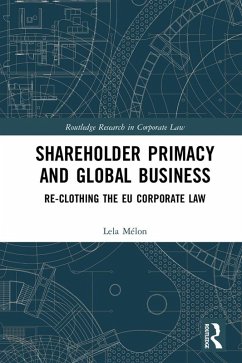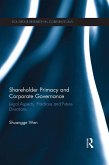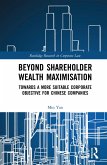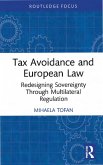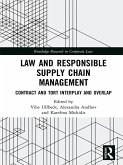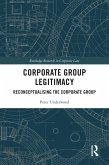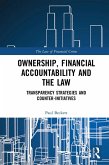43,95 €
43,95 €
inkl. MwSt.
Sofort per Download lieferbar

22 °P sammeln
43,95 €
Als Download kaufen

43,95 €
inkl. MwSt.
Sofort per Download lieferbar

22 °P sammeln
Jetzt verschenken
Alle Infos zum eBook verschenken
43,95 €
inkl. MwSt.
Sofort per Download lieferbar
Alle Infos zum eBook verschenken

22 °P sammeln
- Format: PDF
- Merkliste
- Auf die Merkliste
- Bewerten Bewerten
- Teilen
- Produkt teilen
- Produkterinnerung
- Produkterinnerung

Bitte loggen Sie sich zunächst in Ihr Kundenkonto ein oder registrieren Sie sich bei
bücher.de, um das eBook-Abo tolino select nutzen zu können.
Hier können Sie sich einloggen
Hier können Sie sich einloggen
Sie sind bereits eingeloggt. Klicken Sie auf 2. tolino select Abo, um fortzufahren.

Bitte loggen Sie sich zunächst in Ihr Kundenkonto ein oder registrieren Sie sich bei bücher.de, um das eBook-Abo tolino select nutzen zu können.
Going beyond solely legal analysis, juxtaposing legal principles and argumentation with economic theoretic approaches and more importantly, real-life examples, the book is accessible to both professionals and academics working within the fields of business, economics, corporate governance and corporate law.
- Geräte: PC
- mit Kopierschutz
- eBook Hilfe
- Größe: 1.87MB
Andere Kunden interessierten sich auch für
![Shareholder Primacy and Global Business (eBook, ePUB) Shareholder Primacy and Global Business (eBook, ePUB)]() Lela MélonShareholder Primacy and Global Business (eBook, ePUB)43,95 €
Lela MélonShareholder Primacy and Global Business (eBook, ePUB)43,95 €![Shareholder Primacy and Corporate Governance (eBook, PDF) Shareholder Primacy and Corporate Governance (eBook, PDF)]() Shuangge WenShareholder Primacy and Corporate Governance (eBook, PDF)48,95 €
Shuangge WenShareholder Primacy and Corporate Governance (eBook, PDF)48,95 €![Beyond Shareholder Wealth Maximisation (eBook, PDF) Beyond Shareholder Wealth Maximisation (eBook, PDF)]() Min YanBeyond Shareholder Wealth Maximisation (eBook, PDF)46,95 €
Min YanBeyond Shareholder Wealth Maximisation (eBook, PDF)46,95 €![Tax Avoidance and European Law (eBook, PDF) Tax Avoidance and European Law (eBook, PDF)]() Mihaela TofanTax Avoidance and European Law (eBook, PDF)21,95 €
Mihaela TofanTax Avoidance and European Law (eBook, PDF)21,95 €![Law and Responsible Supply Chain Management (eBook, PDF) Law and Responsible Supply Chain Management (eBook, PDF)]() Law and Responsible Supply Chain Management (eBook, PDF)42,95 €
Law and Responsible Supply Chain Management (eBook, PDF)42,95 €![Corporate Group Legitimacy (eBook, PDF) Corporate Group Legitimacy (eBook, PDF)]() Peter UnderwoodCorporate Group Legitimacy (eBook, PDF)42,95 €
Peter UnderwoodCorporate Group Legitimacy (eBook, PDF)42,95 €![Ownership, Financial Accountability and the Law (eBook, PDF) Ownership, Financial Accountability and the Law (eBook, PDF)]() Paul BeckettOwnership, Financial Accountability and the Law (eBook, PDF)43,95 €
Paul BeckettOwnership, Financial Accountability and the Law (eBook, PDF)43,95 €-
-
-
Going beyond solely legal analysis, juxtaposing legal principles and argumentation with economic theoretic approaches and more importantly, real-life examples, the book is accessible to both professionals and academics working within the fields of business, economics, corporate governance and corporate law.
Dieser Download kann aus rechtlichen Gründen nur mit Rechnungsadresse in A, B, BG, CY, CZ, D, DK, EW, E, FIN, F, GR, HR, H, IRL, I, LT, L, LR, M, NL, PL, P, R, S, SLO, SK ausgeliefert werden.
Produktdetails
- Produktdetails
- Verlag: Taylor & Francis eBooks
- Seitenzahl: 285
- Erscheinungstermin: 13. März 2019
- Englisch
- ISBN-13: 9780429592072
- Artikelnr.: 55712947
- Verlag: Taylor & Francis eBooks
- Seitenzahl: 285
- Erscheinungstermin: 13. März 2019
- Englisch
- ISBN-13: 9780429592072
- Artikelnr.: 55712947
- Herstellerkennzeichnung Die Herstellerinformationen sind derzeit nicht verfügbar.
Dr. Lela Mélon is a Marie Curie Fellow at the University Pompeu Fabra - UPF, Spain.
Content
Acknowledgments
1. Corporations, shareholders and society: where do we start? *
2. The incompleteness of modern corporate laws *
2.1 Shareholder primacy as a legal rule - case of the UK *
2.2 Shareholder primacy in the U.S.: not a legal rule yet mandated by the market? Using Adam Smith's Invisible Hand *
2.3 Shareholder primacy as a binding corporate law precedent? The U.S. and UK example *
2.3.1 Takeovers as a specific corporate situation - shareholders in the forefront *
2.3.2 The Myth Lives Nonetheless *
2.3.3 Corporate Right to Its Own Decisions *
2.3.4 US case law as pro- 'traditional shareholder primacy' *
2.3.5 The UK case law as pro- 'traditional shareholder primacy' *
2.4 Berle and Means and the shareholder primacy *
2.5 The Efficiency Arguments in Legal Academia *
2.5.1 Manne and Friedman: Old Premises, New Theory *
2.5.2 Friedman expanded and re-shaped *
2.5.3 Efficiency as the guaranteed outcome of shareholder primacy *
2.6 The penetration of the shareholder primacy in the EU corporate law system *
2.6.1 The End of History thesis and its pitfalls *
2.6.2 The EU and the shareholder-primacy: historical and conceptual perspective *
a) The EU harmonization task limited by stakeholder considerations *
b) The call of the globalised capital markets *
c) The CJEU and shareholder-value orientation *
d) The end result: the misfit of the EU company law and the shareholder value orientation *
2.6.3 The EU need of sustainable companies *
3. Future developments: how can corporate law contribute to sustainable development? The notion of 'sustainable company' *
3.1 Preliminary question: does corporate law matter for business development? *
3.2 The pressing need for sustainable and all-inclusive business framework *
3.3 The sphere of corporate influence *
3.4 Corporate Social Responsibility as a partial remedy *
3.4.1 The impact of CSR *
3.4.2 'Soft' and diversified approach to CSR *
3.4.3 From the regulation for business to the regulation of business *
3.5 The obsoleteness of the EU CSR and the topicality of the EU sustainable company *
3.5.1 CSR 3.0: Sustainable Company and the EU Corporate Law *
3.5.2 The extension of the prisoner's dilemma: The Mutual Assured Environmental Destruction Game *
3.5.3 The presence of EU's first-mover advantage: time to act! *
3.5.4 A centipede game of irrational behaviour? *
3.6 Corporate law re-clothed: suggestions for EU legislative changes *
4. The EU's competence for becoming global sustainability leader *
4.1 The existing possibilities for action under the EU corporate law framework *
4.2 Treaty provisions imposing consideration of sustainability on EU bodies *
4.2.1 EU competence and legal basis *
4.2.2 The substance of the EU regulatory action *
4.3 Embedding sustainability in EU corporate law framework *
4.4 Planned and existing EU instruments for furthering corporate sustainability policy *
4.4.1 The Non-Financial Reporting Directive *
4.4.2 'The Experiment' and Example of Public Procurement Rules: EU leading by example *
4.5 The EU Prospects *
5. Conclusions *
6. Bibliography *
Book *
Contribution *
Court Decision *
Internet Document *
Journal Article *
Report or Gray Literature *
Statute or Regulation *
Miscellaneous *
Index
Acknowledgments
1. Corporations, shareholders and society: where do we start? *
2. The incompleteness of modern corporate laws *
2.1 Shareholder primacy as a legal rule - case of the UK *
2.2 Shareholder primacy in the U.S.: not a legal rule yet mandated by the market? Using Adam Smith's Invisible Hand *
2.3 Shareholder primacy as a binding corporate law precedent? The U.S. and UK example *
2.3.1 Takeovers as a specific corporate situation - shareholders in the forefront *
2.3.2 The Myth Lives Nonetheless *
2.3.3 Corporate Right to Its Own Decisions *
2.3.4 US case law as pro- 'traditional shareholder primacy' *
2.3.5 The UK case law as pro- 'traditional shareholder primacy' *
2.4 Berle and Means and the shareholder primacy *
2.5 The Efficiency Arguments in Legal Academia *
2.5.1 Manne and Friedman: Old Premises, New Theory *
2.5.2 Friedman expanded and re-shaped *
2.5.3 Efficiency as the guaranteed outcome of shareholder primacy *
2.6 The penetration of the shareholder primacy in the EU corporate law system *
2.6.1 The End of History thesis and its pitfalls *
2.6.2 The EU and the shareholder-primacy: historical and conceptual perspective *
a) The EU harmonization task limited by stakeholder considerations *
b) The call of the globalised capital markets *
c) The CJEU and shareholder-value orientation *
d) The end result: the misfit of the EU company law and the shareholder value orientation *
2.6.3 The EU need of sustainable companies *
3. Future developments: how can corporate law contribute to sustainable development? The notion of 'sustainable company' *
3.1 Preliminary question: does corporate law matter for business development? *
3.2 The pressing need for sustainable and all-inclusive business framework *
3.3 The sphere of corporate influence *
3.4 Corporate Social Responsibility as a partial remedy *
3.4.1 The impact of CSR *
3.4.2 'Soft' and diversified approach to CSR *
3.4.3 From the regulation for business to the regulation of business *
3.5 The obsoleteness of the EU CSR and the topicality of the EU sustainable company *
3.5.1 CSR 3.0: Sustainable Company and the EU Corporate Law *
3.5.2 The extension of the prisoner's dilemma: The Mutual Assured Environmental Destruction Game *
3.5.3 The presence of EU's first-mover advantage: time to act! *
3.5.4 A centipede game of irrational behaviour? *
3.6 Corporate law re-clothed: suggestions for EU legislative changes *
4. The EU's competence for becoming global sustainability leader *
4.1 The existing possibilities for action under the EU corporate law framework *
4.2 Treaty provisions imposing consideration of sustainability on EU bodies *
4.2.1 EU competence and legal basis *
4.2.2 The substance of the EU regulatory action *
4.3 Embedding sustainability in EU corporate law framework *
4.4 Planned and existing EU instruments for furthering corporate sustainability policy *
4.4.1 The Non-Financial Reporting Directive *
4.4.2 'The Experiment' and Example of Public Procurement Rules: EU leading by example *
4.5 The EU Prospects *
5. Conclusions *
6. Bibliography *
Book *
Contribution *
Court Decision *
Internet Document *
Journal Article *
Report or Gray Literature *
Statute or Regulation *
Miscellaneous *
Index
Content
Acknowledgments
1. Corporations, shareholders and society: where do we start? *
2. The incompleteness of modern corporate laws *
2.1 Shareholder primacy as a legal rule - case of the UK *
2.2 Shareholder primacy in the U.S.: not a legal rule yet mandated by the market? Using Adam Smith's Invisible Hand *
2.3 Shareholder primacy as a binding corporate law precedent? The U.S. and UK example *
2.3.1 Takeovers as a specific corporate situation - shareholders in the forefront *
2.3.2 The Myth Lives Nonetheless *
2.3.3 Corporate Right to Its Own Decisions *
2.3.4 US case law as pro- 'traditional shareholder primacy' *
2.3.5 The UK case law as pro- 'traditional shareholder primacy' *
2.4 Berle and Means and the shareholder primacy *
2.5 The Efficiency Arguments in Legal Academia *
2.5.1 Manne and Friedman: Old Premises, New Theory *
2.5.2 Friedman expanded and re-shaped *
2.5.3 Efficiency as the guaranteed outcome of shareholder primacy *
2.6 The penetration of the shareholder primacy in the EU corporate law system *
2.6.1 The End of History thesis and its pitfalls *
2.6.2 The EU and the shareholder-primacy: historical and conceptual perspective *
a) The EU harmonization task limited by stakeholder considerations *
b) The call of the globalised capital markets *
c) The CJEU and shareholder-value orientation *
d) The end result: the misfit of the EU company law and the shareholder value orientation *
2.6.3 The EU need of sustainable companies *
3. Future developments: how can corporate law contribute to sustainable development? The notion of 'sustainable company' *
3.1 Preliminary question: does corporate law matter for business development? *
3.2 The pressing need for sustainable and all-inclusive business framework *
3.3 The sphere of corporate influence *
3.4 Corporate Social Responsibility as a partial remedy *
3.4.1 The impact of CSR *
3.4.2 'Soft' and diversified approach to CSR *
3.4.3 From the regulation for business to the regulation of business *
3.5 The obsoleteness of the EU CSR and the topicality of the EU sustainable company *
3.5.1 CSR 3.0: Sustainable Company and the EU Corporate Law *
3.5.2 The extension of the prisoner's dilemma: The Mutual Assured Environmental Destruction Game *
3.5.3 The presence of EU's first-mover advantage: time to act! *
3.5.4 A centipede game of irrational behaviour? *
3.6 Corporate law re-clothed: suggestions for EU legislative changes *
4. The EU's competence for becoming global sustainability leader *
4.1 The existing possibilities for action under the EU corporate law framework *
4.2 Treaty provisions imposing consideration of sustainability on EU bodies *
4.2.1 EU competence and legal basis *
4.2.2 The substance of the EU regulatory action *
4.3 Embedding sustainability in EU corporate law framework *
4.4 Planned and existing EU instruments for furthering corporate sustainability policy *
4.4.1 The Non-Financial Reporting Directive *
4.4.2 'The Experiment' and Example of Public Procurement Rules: EU leading by example *
4.5 The EU Prospects *
5. Conclusions *
6. Bibliography *
Book *
Contribution *
Court Decision *
Internet Document *
Journal Article *
Report or Gray Literature *
Statute or Regulation *
Miscellaneous *
Index
Acknowledgments
1. Corporations, shareholders and society: where do we start? *
2. The incompleteness of modern corporate laws *
2.1 Shareholder primacy as a legal rule - case of the UK *
2.2 Shareholder primacy in the U.S.: not a legal rule yet mandated by the market? Using Adam Smith's Invisible Hand *
2.3 Shareholder primacy as a binding corporate law precedent? The U.S. and UK example *
2.3.1 Takeovers as a specific corporate situation - shareholders in the forefront *
2.3.2 The Myth Lives Nonetheless *
2.3.3 Corporate Right to Its Own Decisions *
2.3.4 US case law as pro- 'traditional shareholder primacy' *
2.3.5 The UK case law as pro- 'traditional shareholder primacy' *
2.4 Berle and Means and the shareholder primacy *
2.5 The Efficiency Arguments in Legal Academia *
2.5.1 Manne and Friedman: Old Premises, New Theory *
2.5.2 Friedman expanded and re-shaped *
2.5.3 Efficiency as the guaranteed outcome of shareholder primacy *
2.6 The penetration of the shareholder primacy in the EU corporate law system *
2.6.1 The End of History thesis and its pitfalls *
2.6.2 The EU and the shareholder-primacy: historical and conceptual perspective *
a) The EU harmonization task limited by stakeholder considerations *
b) The call of the globalised capital markets *
c) The CJEU and shareholder-value orientation *
d) The end result: the misfit of the EU company law and the shareholder value orientation *
2.6.3 The EU need of sustainable companies *
3. Future developments: how can corporate law contribute to sustainable development? The notion of 'sustainable company' *
3.1 Preliminary question: does corporate law matter for business development? *
3.2 The pressing need for sustainable and all-inclusive business framework *
3.3 The sphere of corporate influence *
3.4 Corporate Social Responsibility as a partial remedy *
3.4.1 The impact of CSR *
3.4.2 'Soft' and diversified approach to CSR *
3.4.3 From the regulation for business to the regulation of business *
3.5 The obsoleteness of the EU CSR and the topicality of the EU sustainable company *
3.5.1 CSR 3.0: Sustainable Company and the EU Corporate Law *
3.5.2 The extension of the prisoner's dilemma: The Mutual Assured Environmental Destruction Game *
3.5.3 The presence of EU's first-mover advantage: time to act! *
3.5.4 A centipede game of irrational behaviour? *
3.6 Corporate law re-clothed: suggestions for EU legislative changes *
4. The EU's competence for becoming global sustainability leader *
4.1 The existing possibilities for action under the EU corporate law framework *
4.2 Treaty provisions imposing consideration of sustainability on EU bodies *
4.2.1 EU competence and legal basis *
4.2.2 The substance of the EU regulatory action *
4.3 Embedding sustainability in EU corporate law framework *
4.4 Planned and existing EU instruments for furthering corporate sustainability policy *
4.4.1 The Non-Financial Reporting Directive *
4.4.2 'The Experiment' and Example of Public Procurement Rules: EU leading by example *
4.5 The EU Prospects *
5. Conclusions *
6. Bibliography *
Book *
Contribution *
Court Decision *
Internet Document *
Journal Article *
Report or Gray Literature *
Statute or Regulation *
Miscellaneous *
Index
